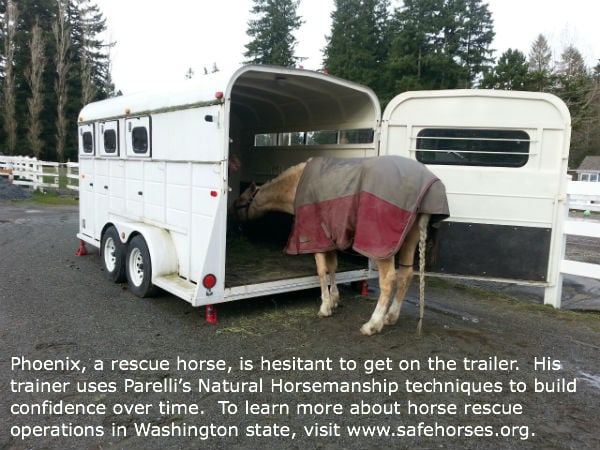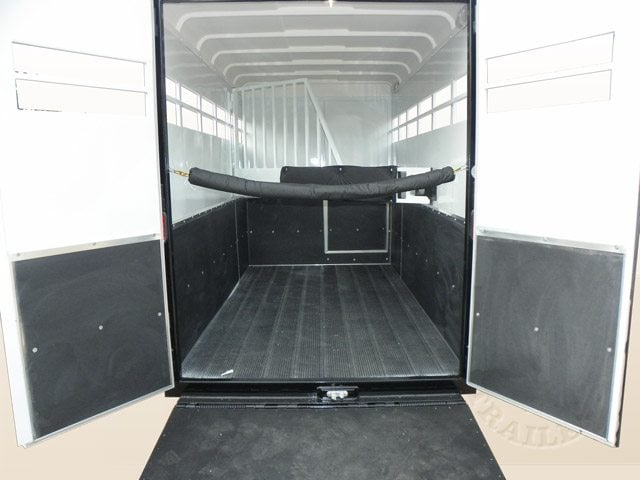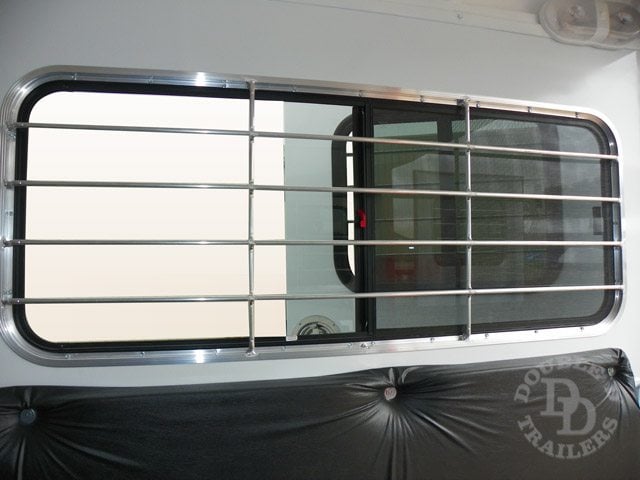Fighting Natural Instinct: How to Pick a Horse Trailer that Your Horse Will Love
Choosing the perfect horse trailer is no easy task. There are a million decisions that need to be made regarding things like size, style, brand, budget, bells, and whistles. But did you forget something during your buying process? Is there someone’s opinion your forgot to ask? What does your horse think of your new trailer? There are many trailers on the market that may seem like dream rigs but are actually horse nightmares on wheels! Read on to learn a bit about what makes your horse tick and what kind of trailer is at the top of his wish list.
Consider Your Horse’s Natural Instincts Regarding Trailers
 So what does your horse think of trailer riding? Well, one thing is certain. There is nothing natural about a horse climbing into a dark metal box on wheels to be locked in and driven down the highway at 60+ mph.
So what does your horse think of trailer riding? Well, one thing is certain. There is nothing natural about a horse climbing into a dark metal box on wheels to be locked in and driven down the highway at 60+ mph.
Horses are naturally prey animals with a strong ‘flight or fight’ instinct. This hard wiring has helped them survive and thrive over the millennia. Consequently, they do best in wide-open areas where they can both see and flee when a threat is perceived. In the past, any horse that reacted too slowly became dinner.
With this natural instinct in mind, it is easier to understand how some trailers can make a horse feel trapped and claustrophobic.
Horse trailers are also big scary ‘objects.’ Horses don’t like objects. That is why they will plant their feet, snort, and raise their heads high when they come across new things. A plastic tarp, an umbrella, an unfamiliar piece of farm equipment…sometimes it doesn’t take much to put your horse on high alert. It can take him some time to learn that this new object is not going to cause him any harm.
Now think of your trailer. It makes noise when you step on it, it blocks light, and the flooring doesn’t quite feel…normal. When you ask your horse to load onto a trailer, he needs to process all of these things while his slow-to-adjust eyes see a dark confined area with no route for escape.
Yes, horse trailers can be very scary for some horses.
Luckily, years of training and trust building have helped many horses overcome these natural instincts and faithfully follow their owners on board. Remember this. Just because you managed to load your horse onto the trailer and start your journey, don’t assume he’s not sweating in his horse boots back there. Your horse can still experience significant stress while riding in a horse trailer.
What Are The Physical Effects of Stress?

Stress can be defined as any external stimulus that is beyond the control of your horse. In a more natural environment, a horse’s reaction to this stress serves a purpose. An autonomic nervous system response including elevated heart rate, cortisol release, adrenaline, and epinephrine help prepare your horse to flee from danger. In a trailer, he can’t flee so he has to endure this physical response for an extended period of time impairing his ability to fight off illness.
Shipping fever (pleuropneumonia) is one example of an illness that is aggravated by elevated levels of stress during long duration trips. Often, horses will become somewhat dehydrated during journeys so they are unable to effectively clear out infectious materials from their lungs by snorting. Irritants and allergens in their hay, bedding, or from their urine can irritate their airways. An elevated level of cortisol in their system - due to stress - decreases their immunity and their ability to combat an infection. What results is a potentially fatal respiratory infection.
Stress can also make your horse behave irrationally so he injuries himself inside the trailer. We are all aware of the scary situations that can arise when horses panic.
A Horse’s Basic Needs For Trailer Survival
Now that we understand the natural instincts of horses and how stress can affect their bodies, we can look at the specific things they would want in a perfectly designed trailer. The list is pretty short:
Light to See
Room to Move
Air to Breathe
Safety from Danger
Let’s take a look at these one-by-one…
Light to See

You should also consider the paint in your trailer’s interior. White paint reflects light better to make the interior more inviting. Features like tubular head dividers are great because they allow the horses to fully see the trailer’s interior and their travel buddy.
Room to Move
Providing enough ‘room to move’ may seem like a no-brainer, but many owners try to shove their gigantic horses through narrow entry doors into confined stalls. Just take a look at any conventional slant load horse trailer on the market. A stationary tack storage area in the back creates a tight squeeze for your horse that is both scary and unsafe. Instead, look for slant load designs like the SafeTack models with a wide-open entryway. This will seem much less scary to your horse.
You also need to consider the size of your horse in comparison to the trailer stall size. Brad Heath, Double D Trailers owner, recommends that you measure your horse from nose to rump before purchasing a trailer. Make sure that he has enough room to spread his legs for balance. The ability to stretch out his head and neck will also help him stay centered while the rig is in motion.
Brad explained, “The SafeTack models will safely support a horse that is 15.3 to 16.0 hands high, but any horse larger than that may need additional footage.” A custom horse trailer from Double D Trailers can be a great option so you can build the trailer to fit your horse.
Finally, make sure that your horse has the ability to lower his head and cough out matter during travel. Walk-through designs instead of manger designs tend to be better for this. Plus, he won’t feel like his head is stuck in a dark hole at the front of the rig.
Air to Breathe

Ventilation from windows, wall slats, roof pop-up vents, and even from wooden floor slats can help promote airflow to disperse these irritants. Minimizing these air nasties can help keep your horse’s respiratory system healthier during long trips and prevent problems like shipping fever.
Safety from Danger
Now that we’ve figured out how to help your horse comfortably see, move, and breath, let’s look at the other safety features that he will appreciate. Basically, your horse wants to avoid any sort of pain while standing in the trailer. For this reason, the interior should be designed to keep him safe and unharmed.
Check that the interior has two-inches of padding and is free of any sharp edges that can cut him during travel. Chest bars, butt bars, dividers and tie loops should all be strong and secure so they don’t rattle while the trailer is in motion. Features like a SafeBump roof and SafeKick walls will provide protection if he decides to rear or kick.
The internal temperature of the trailer should not be too hot or your horse will experience stress and the danger of dehydration. A white interior will help lower this internal temperature.

The ramp and flooring should feel solid and safe to your horse so he feels like he has a secure footing. Flooring materials like treated lumber or rumber flooring are best to prevent the transfer of heat, noise, and vibration from the road up into his legs when traveling down the road.
If you remember to consider your horse’s thoughts and feelings when choosing a trailer you are much more likely to purchase a model that makes everyone happier. Your horse will experience less stress and you will have a better start to your day’s adventure.
Happy travels!

